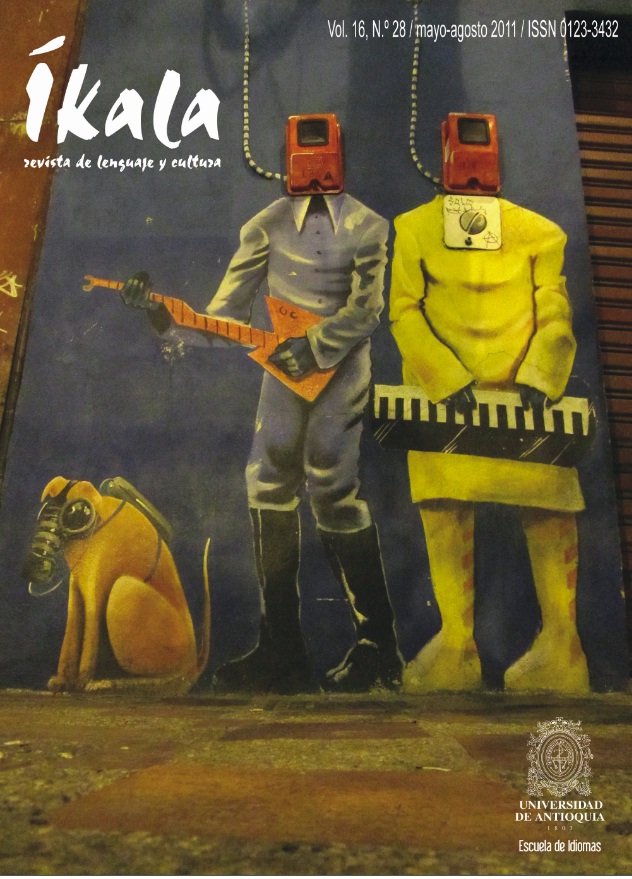Explorando la Identidad del Escritor en la Escritura Académica de Estudiantes Mexicanos de Efl
DOI:
https://doi.org/10.17533/udea.ikala.8002Palabras clave:
identidad de escritor, análisis textual, pronombres, escritura académica, escritura en inglés como lengua extranjera.Resumen
El objetivo de este estudio fue explorar la identidad autoral en los textos en inglés de estudiantes universitarios mexicanos de Lingüística Aplicada. Analizamos el uso de pronombres en primera persona y la forma en la que los participantes conceptualizaban su identidad como autores de sus ensayos. Empleamos una combinación de análisis textual y entrevista basada en discurso. Los resultados indican que los participantes que hicieron un uso amplio de los pronombres en primera persona los emplearon para presentar experiencias personales más que para proyectar una identidad autoral fuerte. En cambio, los que hicieron poco uso de estos pronombres proyectaron una identidad autoral más fuerte a través del empleo de una variedad de recursos lingüísticos. El uso de pronombres en primera persona no es esencial en el desarrollo de una identidad autoral fuerte. La educación superior debería proporcionar mayores oportunidades y recursos para que los estudiantes aprendan a proyectar una presencia autoral fuerte en los textos académicos que redactan en inglés.
Descargas
Citas
Cadman, K. (1997). Thesis writing for international students: a question of identity? English for Specific Purposes, 16 (1), 3-14.
Cherry, R. (1988). Ethos versus persona: Self-representation in written discourse. Written Communication, 5 (3), 251-276.
Clark, R. & Ivanic, R. (1997). The Politics of Writing. London: Routledge.
Glaser, B. G. & Strauss, A. L. (1967). The Discovery ofGrounded Theory. Hawthorne, NY: Aldine.
Harwood, N. (2005). Nowhere has anyone attempted... In this article I am to do just that' A corpus-based study of self-promotional I and We in academic writing across four disciplines. Journal ofPragmatics, 37, 1.207-1.231. Retrieved on August 10, 2010, from:
http://privatewww.essex.ac.uk/~nharwood/Self-Promotional%20Pronouns%20Final%20Version.pd
Hyland, K. (2000). Authority and invisibility: authorial identity in academic writing. Journal of Pragmatics, 34, 1.091-1.112. Retrieved on
November 3, 2010, from: http://www2.caes.hku.hk/kenhyland/files/2010/12/invisibility.jop_.pdf
Hyland, K. (2001). Humble servants of discipline? Self-mention in research articles. English for Specific Purposes, 20, 207-226.
Hyland, K. (2002a). Options of identity in academic writing. ELT Journal, 56 (4), 351-357. Retrieved on November 12, 2010, from: http://www2.caes.hku.hk/kenhyland/files/2010/12/self.ESP_.pdf
Hyland, K. (2002b). Teaching and researching writing. GB: Pearson Education.
Hyland, K. (2002c). Authority and invisibility: authorial identity in academic writing. Journal of Pragmatics, 34, 1.091-1.112. Retrieved on November 3, 2010, from: http://www2.caes.hku.hk/kenhyland/files/2010/12/invisibility.jop_.pdf
Hyland, K.. (2004a). Disciplinary Discourses: Social Interactions in Academic Writing. Ann Arbor, MI: The University of Michigan Press.
Hyland, K. (2004b). Disciplinary interactions: metadiscourse in L2 postgraduate writing. Journal of Second Language Writing, 13, 133-151. Retrieved on November 5, 2010, from: http://www2.caes.hku.hk/kenhyland/files/2010/12/md-dissertations.pdf
Hyland, K. (2005). Metadiscourse. London: Continuum.
Ivanic, R. (1998). Writing and Identity: The Discoursal Construction ofldentity in Academic Writing. Amsterdam: Benjamins.
Ivanic, R. & Weldon, S. (1999). Researching the writer-reader relationship. In Candlin, C. N. & Hyland, K. (Eds.), Writing: Texts, Processes and Practices (pp. 168-192). London: Longman.
Kuo, C. H. (1999). The use of personal pronouns: Role relationships in scientific journal articles. English for Specific Purposes, 18 (2),
-138.
Lincoln, Y. S. & Guba, E. G. (1985). Naturalistic inquiry. London: Sage.
Martínez, I. A. (2005). Native and non-native writers' use of first person pronouns in the different sections of biology research articles in English. Journal of Second Language Writing, 14, 174-190.
Navarro, M. A., Sánchez, I., Cruz, L. y Lladó, D. (2005). La reforma universitaria en la Universidad Autónoma de Tamaulipas. México: UAT.
Odell, L., Goswami, D. & Herrington, A. (1983). The discourse-based interview: A procedure for exploring the tacit knowledge of writers in nonacademic settings. In Mosenthal, P., Tamor, L. & Walmsley, S. A. (Eds.), Research on Writing: Principles and Methods (pp. 221-236). New York: Longman.
Shen, F. (1989). The classroom and the wider culture: Identity as a key to learning English composition. In Camel, V. & Spack, R. (Eds.), Negotiating Academic Literacies: Teaching and Learning Across Languages and Cultures (pp. 123-133). NJ: Lawrence Erlbaum
Tang, R. & John, S. (1999). The ''I'' in identity: Exploring writer identity in student academic writing through the first person pronoun. English for Specific Purposes, 18, 23-39.
Universidad Autónoma de Tamaulipas (2006). Plan estratégico de desarrollo institucional 20062010. México: UAT.
Vande Kopple, W. J. (1985). Some exploratory discourse on metadiscourse. College Composition and Communication, 36, 82-93.
Vassileva, I. (1998). Who am I/who are we in academic writing? International Journal of Applied Linguistics, 8 (2), 163-185.
Vassileva, I. (2000). Who is the author? A Contrastive Analysis of Authorial Presence in English, German, French, Russian and Bulgarian Academic Discourse. Sankt Augustin: As-gard.












